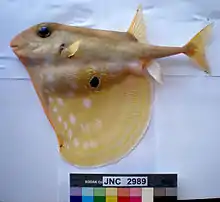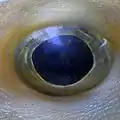Threetooth puffer
Triodon macropterus, also known as the threetooth puffer, is a tetraodontiform fish, the only living species in the genus Triodon and family Triodontidae.[1] Other members of the family are known from fossils stretching back to the Eocene.[2]
| Threetooth puffer | |
|---|---|
 | |
| Triodon macropterus, with extended belly flap | |
| Scientific classification | |
| Kingdom: | |
| Phylum: | |
| Class: | |
| Order: | |
| Family: | Triodontidae Bleeker, 1865-69 |
| Genus: | Triodon G. Cuvier, 1829 |
| Species: | T. macropterus |
| Binomial name | |
| Triodon macropterus Lesson, 1831 | |
It is native to the Indo-Pacific, where it is found at depths to 300 m (980 ft).[3] Its name comes from the Ancient Greek τρι- (tri-, meaning 'three') and ὀδούς (or ὀδών, odoús, odṓn, meaning 'tooth'), and refers to the three fused teeth making up a beak-like structure.
The threetooth puffer reaches a maximum length of 54 cm (21 in).[3] It has a distinctive shape, with a huge belly flap as large as or larger than its body; it inflates this with seawater when threatened. The flap bears an eye-spot, and is inflated by rotating the shaft-like pelvis downwards. This makes the animal appear much larger to predators, and less likely to be eaten.[2]
The threetooth puffer is also known as the black-spot keeled pufferfish, and was first scientifically described by Lesson in 1831.[4]
 Freshly caught specimen, belly flap half extended
Freshly caught specimen, belly flap half extended Eye
Eye Eye-looking lateral black spot
Eye-looking lateral black spot Teeth
Teeth Museum specimen
Museum specimen Drawing by Cuvier
Drawing by Cuvier
References
- Matsuura, K. (2014): Taxonomy and systematics of tetraodontiform fishes: a review focusing primarily on progress in the period from 1980 to 2014. Ichthyological Research, 62 (1): 72-113.
- Matsuura, K. & Tyler, J.C. (1998). Paxton, J.R. & Eschmeyer, W.N. (eds.). Encyclopedia of Fishes. San Diego: Academic Press. p. 230. ISBN 0-12-547665-5.
- Froese, Rainer and Pauly, Daniel, eds. (2015). "Triodon macropterus" in FishBase. February 2015 version.
- Gomon, M.F. & Dianne J. Bray, D.J. (2011): Threetooth Puffer, Triodon macropterus, Fishes of Australia.